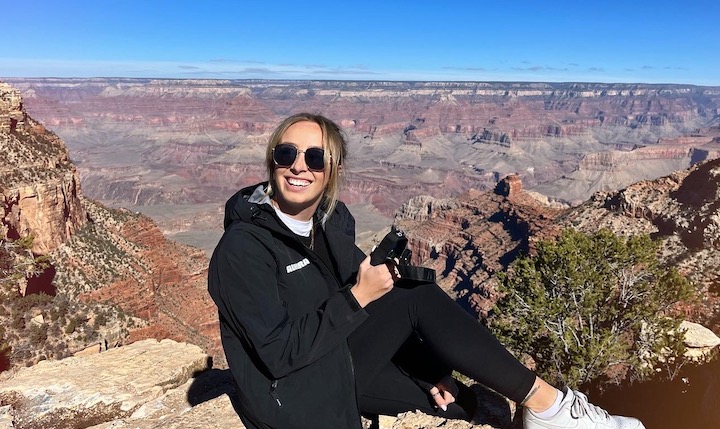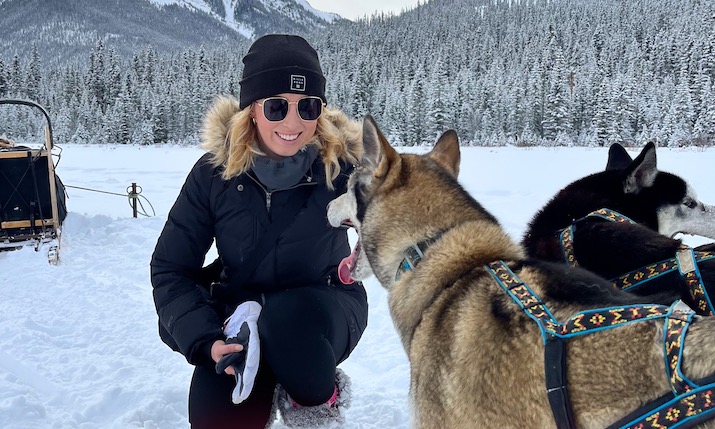Stepping Stones: Lauren Morgan talks career progression and seizing opportunities at Aurora

On site for Nitro RX at the Grand Canyon
After just a few years in the industry, Lauren Morgan, production coordinator at Aurora, is steadily working her way up the ranks. In our latest Stepping Stones interview, she shares her advice on breaking into the industry and her future career plans.
What is your job role today and what do you love about it?
I’m a production coordinator at Aurora. I love my job as every day you are entering the unknown; one day it can be quiet and pretty smooth sailing, and the next it can be utter chaos with 101 things to do! You’re always kept on your toes.
At Aurora there are also opportunities to travel the world with the productions you work on, which for me is an absolute bonus. Being able to combine my love of travelling along with my work is amazing.

Dog sledding in the Rockies during the Canadian leg of Nitro RX
What does your current job entail on a day-to-day basis?
As a production coordinator I am responsible for taking care of all the travel logistics on behalf of the crew in the lead up to a production or event, working closely alongside the production manager to ensure the whole production is set up and runs smoothly. This can range from booking crew, flights, hotels, hire cars, transfers and kit; to ordering carnets, creating call sheets and arranging meetings.
When onsite at an event the day-to-day tasks can be random, depending on what production you’re working on. It can be as normal as handing out accreditation to the crew, to as random as running round an ice racetrack through knee-deep snow to get our talent put in a snow plough for a one minute shoot, within a 10 minute timeframe. Each day can be unique!
Can you talk us through your relevant education that helped you break into the sports broadcasting industry?
I went to Birmingham City University and studied Media and Communications, covering various modules such as photography and visual design. However, the area that I loved the most was television production. By my final year I had turned my focus solely towards this module, knowing that I wanted to enter the TV industry once I had graduated. Despite not always needing a degree to enter the industry I found it useful as it allowed me to gain a better understanding of what roles there are available and give each of them a trial run during projects.
How did you get your first job in sports broadcasting, what was the role, and when?
My first job in sports broadcasting was actually here at Aurora back in 2019. The only experience I’d had prior to this was a week’s worth of shadowing various roles in the gallery at Premier League Productions. I was pretty fresh out of university with minimal industry experience and Aurora was kind enough to hire me full-time as office co-ordinator.
What happened next to get you where you are today?
During my time at Aurora I have worked my way up from office coordinator, to production secretary to production coordinator. Starting out as office coordinator allowed me to learn and understand the basics, getting an insight into everything that we were up to as a company and observing how things were done. Organisational skills were key, and showing willingness to help productions out when they needed it is what has led me to where I am today.
What job would you like to be in in five or 10 years’ time? What are your career goals?
I guess my career goals could sound generic in the sense of I aim to learn more, achieve more and grow as an individual. More specifically there are certain countries and sports I’d love the opportunity of working within. Naturally in five to 10 years I will have gained a lot more experience as a production co-ordinator, progressing up to junior production manager and then production manager.
“The hardest part about getting a job in the industry is… getting a job in the industry if you don’t know anyone!”
Can you give us some top tips that really helped you get where you are today?
My number one tip is to jump at any given opportunity that comes your way; don’t hesitate if your nerves are holding you back. Instead use them to your advantage and throw yourself in the deep end, that is how you’ll learn and grow within your role.
Can you give us some tips on things not to do or to avoid when trying to get a role you really want?
This is a tough one, but I guess it’s important not to oversell yourself and pretend to understand and know everything already. It’s good to ask questions if you’re not sure, as that’s how you learn! Showing vulnerability and willingness to grow will likely leave other people wanting to help you learn more.
What would you say are the barriers to getting a job in the broadcast industry?
The hardest part about getting a job in the industry is… getting a job in the industry if you don’t know anyone! When I was first out of university I reached out to a lot of companies and rarely heard anything back, which at the time felt quite deflating. It can often take time, perseverance and what can feel like a lot of hassling, but once that foot is in the door then you can build up your network.
What would you recommend to other people thinking of working in the broadcast industry?
In short, give it a go! You might hate it, you might love it. If you’re reading this article, then I think you’ll love it.
